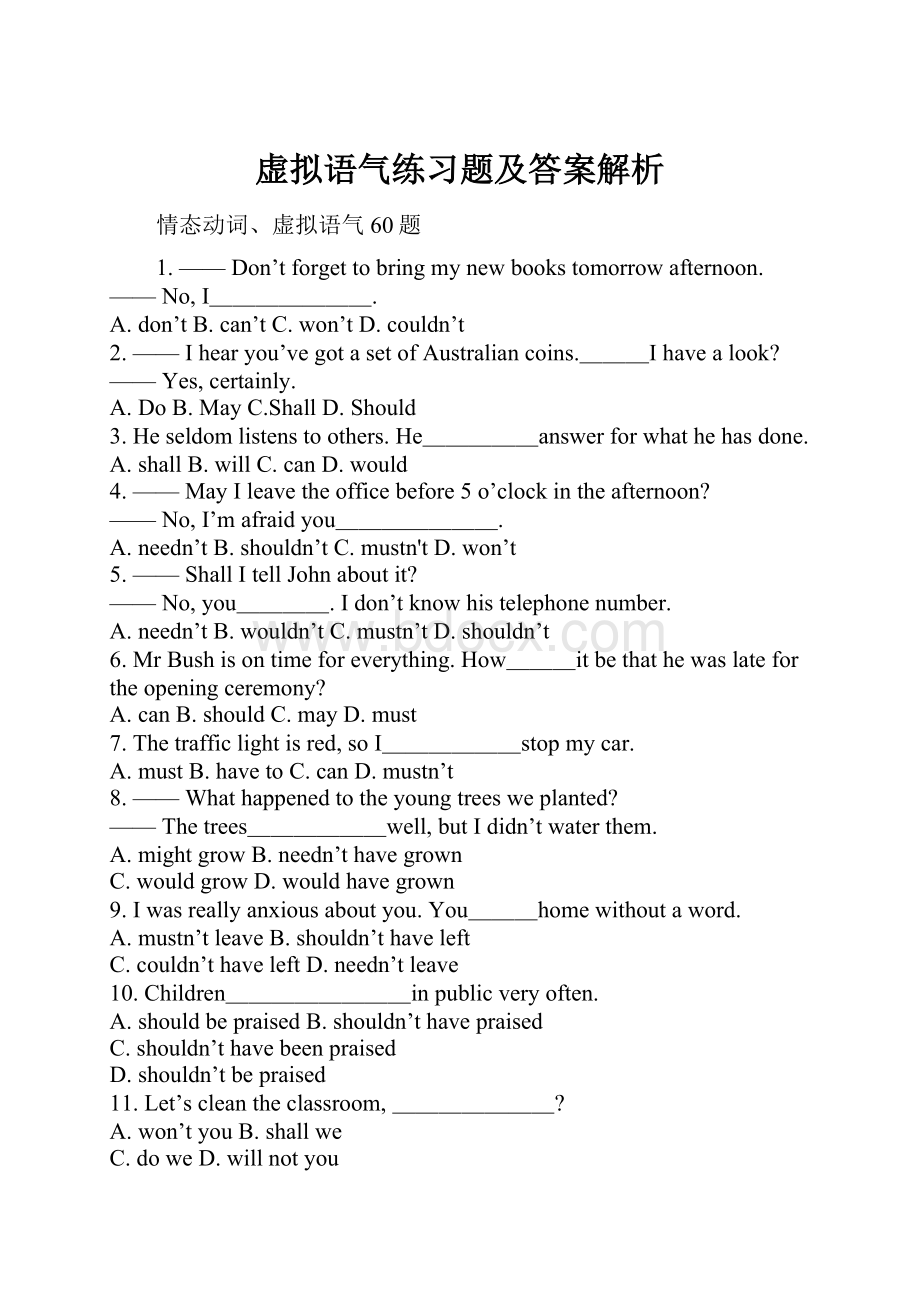虚拟语气练习题及答案解析.docx
《虚拟语气练习题及答案解析.docx》由会员分享,可在线阅读,更多相关《虚拟语气练习题及答案解析.docx(9页珍藏版)》请在冰豆网上搜索。

虚拟语气练习题及答案解析
情态动词、虚拟语气60题
1.——Don’tforgettobringmynewbookstomorrowafternoon.
——No,I_______.
A.don’tB.can’tC.won’tD.couldn’t
2.——Ihearyou’vegotasetofAustraliancoins.___Ihavealook?
——Yes,certainly.
A.DoB.MayC.ShallD.Should
3.Heseldomlistenstoothers.He_____answerforwhathehasdone.
A.shallB.willC.canD.would
4.——MayIleavetheofficebefore5o’clockintheafternoon?
——No,I’mafraidyou_______.
A.needn’tB.shouldn’tC.mustn'tD.won’t
5.——ShallItellJohnaboutit?
——No,you____.Idon’tknowhistelephonenumber.
A.needn’tB.wouldn’tC.mustn’tD.shouldn’t
6.MrBushisontimeforeverything.How___itbethathewaslatefortheopeningceremony?
A.canB.shouldC.mayD.must
7.Thetrafficlightisred,soI______stopmycar.
A.mustB.havetoC.canD.mustn’t
8.——Whathappenedtotheyoungtreesweplanted?
——Thetrees______well,butIdidn’twaterthem.
A.mightgrowB.needn’thavegrown
C.wouldgrowD.wouldhavegrown
9.Iwasreallyanxiousaboutyou.You___homewithoutaword.
A.mustn’tleaveB.shouldn’thaveleft
C.couldn’thaveleftD.needn’tleave
10.Children________inpublicveryoften.
A.shouldbepraisedB.shouldn’thavepraised
C.shouldn’thavebeenpraised
D.shouldn’tbepraised
11.Let’scleantheclassroom,_______?
A.won’tyouB.shallwe
C.doweD.willnotyou
12.Tom_______showhisexamresultstohisparents.
A.darenotB.dared
C.daretoD.daresnotto
13.Idon’tthinkhe_______anewbike.
A.needtobuyB.needsbuy
C.needD.needbuy
14.——Nacy_________theletterfromhermother.
——No,shecan’thave.Thepostmanhasn’tcomeyet.
A.canreceiveB.canhavereceived
C.musthavereceivedD.mustreceive
15.She________thefilm.Sheknowsnothingaboutit.
A.can’tseeB.can’thaveseen
C.mustseeD.mustn’thaveseen
16.Theymusthavebeenherethedaybeforeyesterday,____?
A.mustn’ttheyB.didn’tthey
C.mustn’thavetheyD.hadthey
17.——Ididn’tseeheryesterday.
——Oh,butyou_______________.
A.musthaveB.oughtto
C.shouldhaveD.cannothave
18.——MustItakeabus?
——No,you____.Youcanwalkfromhere.
A.mustnotB.don’t
C.don’thavetoD.hadbetternotto
19.——Whydoyoumakemedoso?
——Iamsorrythatyou________dosuchathing.
A.wouldB.canC.shouldD.may
20.——Willyoustayforlunch?
——Sorry,_____.Mybrotheriscomingtoseeme.
A.Imustn’tB.Ican’t
C.Ineedn’tD.?
won’t
21.Whatwouldhavehappened____,asfarastheriverbank?
A.ifBobhaswalkedfarther
B.ifBobshouldwalkfarther
C.hadBobwalkedfarther
D.ifBobwalkedfarther
22.Youdidn’tletmedrive.Ifwe____inturn,you___sotired.
A.drove;didn’tgetB.drove;wouldn’tget
C.weredriving;wouldn’tget
D.haddriven;wouldn’thavegot
23.Withoutelectricityhumanlife_______quitedifferenttoday.
A.isB.willbe
C.wouldhavebeenD.wouldbe
24.Oh,Janne,you’vebrokenanotherglass.Youought____whenyouwashedit.
A.becarefulB.tocare
C.havecaredD.tohavebeencareful
25.I______oftengofishingwhenIlivedinthecountryside.
A.shouldB.wouldC.couldD.might
26.He______ratherstayathomethangotothecinemawithyou.
A.shouldB.mightC.wouldD.hadbetter
27.It’shightimewe_______tothetheater.
A.willB.shallC.aregoingtoD.went
28.——CouldIuseyourtelephone?
——Yes,ofcourseyou_____________.
A.couldB.willC.canD.might
29.It’sstrangethatthey_____nothingaboutthismatter.
A.knowB.wouldknowC.knowsD.knew
30.Iwishyou______gowithmetomorrow.
A.willB.wouldC.shallD.can
31.——DoyoustillrememberthedaywhenwewenttotheGreatWall?
——Ican’trememberitwell,but______sometimelastautumn?
A.mightitbeB.couldithavebeen
C.coulditbeD.mustithavebeen
32.——Ican’tgetthroughtothegeneralmanager’sofficeanyhow.
——Thelineisbusy.Someone_____thetelephone.
A.mustuseB.uses
C.musthavebeenusingD.mustbeusing
33.Hesuggestswe______tothecinemaatonce,otherwisewewillbelate.
A.mustgoB.goC.willgoD.wouldgo
34.Whenapencilispartlyinaglassofwater,itlooksasif____.
A.breaksB.hasbroken
C.werebrokenD.hadbeenbroken
35.Thegeneralorderedthatthethief____.
A.bepunishedB.wouldpunish
C.wouldbepunishedD.shouldpunish
36.IfonlyI_____howtooperateacomputerasyoudo!
A.hadknownB.wou欤?
know
C.shouldknowD.knew
37.Itissurprisingthathe____atthemeeting.
A.wasB.beC.isD.were
38.Ifyou____waitamoment,I’llgoandfindourmanager.
A.canB.shouldC.willD.must
39.——Doyouthinkhewilldomeafavor?
——AsfarasIknow,heisthelastonetohelpothers.He____bepreparedtogiveyouahand,
though.
A.mightB.mustC.canD.should
40.EventhoughI’dhurtmyleg,I______swimbacktotheriverbank.
A.couldB.mightC.hadtoD.wasableto
41.You_______gotothepartyifyoudon’tfinishyourhomeworkfirst.
A.won’tB.don’tC.oughtn’tD.shan’t
42.——Itisrathercoldhere.Shallwelightafire?
——No,we______becausethingsareeasytocatchfire.
A.won’tB.can’tC.mustn’tD.needn’t
43.I______ProfessorJoneshadtaughtmethisquestion.
A.believeB.deeplythink
C.wishD.suppose
44.Thechairmanrequestedthat___________.
A.themembersstudiedtheproblemmorecarefully
B.theproblemsweremorecarefullystudied
C.theproblemscouldbestudiedwithmorecare
D.themembersstudytheproblemmorecarefully
45.I______itagain.
A.wouldlikeyoutoread
B.wouldlikethatyouread
C.wouldlikeyoureading
D.wouldlikeyouread
46.Ifyoureallywantyourselftobeingoodhealth,youmust___always___somuch.
A.not;besmokingB.not;havesmoked
C.not;tosmokeD.benot;smoking
47.IfI___you,I____moreattentiontoEnglishidiomsandphrases.
A.was;shallpayB.am;willpay
C.wouldbe;wouldpayD.were;wouldpay
48.“Wouldyouhavetoldhimtheanswerhaditbeenpossible?
”
“Iwouldhave,butI____sobusythen.”
A.hadbeenB.wereC.wasD.wouldbe
49.Hehadanexpressionofresentment(不高兴),asifMartin___afoolofhim.
A.hadmadeB.makes
C.madeD.wouldmake
50.____thefog,weshouldhavereachedourschool.
A.BecauseofB.Inspiteof
C.IncaseofD.Butfor
51.Therewasahalfsmileonhisfacewhichsuggestedthathe____happytohavegivenhislifeforhiscountry.
A.wasB.shouldbeC.wouldbeD.were
52.Weallagreedtohersuggestionthatwe______totheGreatWallforsightseeing(观光).
A.willgoB.go
C.shallgoD.shouldhavegone
53.Youmustbeastudent,________you?
A.wasn’tB.areC.mustn’tD.aren’t
54.Theyoungmaninsistedthathe_____nothingwrongand___free.
A.did;setB.haddone;shouldbeset
C.do;besetD.haddone;mustbeset
55.Withoutyourhelp,I____theexamlastterm.
A.failedinB.wouldhavefailed
C.wouldn’tpassD.wouldfail
56._____hecome,theproblemwouldbesettled.
A.WouldB.ShouldC.ShallD.If
57.Veryloudnoise_____makepeopleillordrivethemmad.
A.shouldB.canC.needD.must
58.Ilostyouraddress,otherwiseI____youlongbefore.
A.hadvisitedB.havevisited
C.wouldhavevisitedD.shouldvisit
59.——Where________?
——Igotstuckintheheavytraffic,orI_____hereearlier.
A.didyougo;hadarrived
B.areyou;wouldcome
C.wereyou;wouldcome
D.haveyoubeen;wouldhavebeen
60.I________youabeautifulpresentforyourbirthday,butIwasshortofmoneyatthattime.
A.wouldbuy
B.hadbought
C.wouldliketohavebought
D.musthavebough
参考答案及解析
1.C。
will在此表示“应诺”。
2.B。
MayI...?
中的may用以表示“允许、许可”。
3.A。
shall用于第二、三人称的肯定句或否定句,表示说话人的意愿,有“命令、警告、威胁、强制、允诺、决心”之意。
4.C。
may表示“允许”。
回答may引起的问句,肯定式一般用Yes,ofcourse./Yes,certainly./Sure./Yes,youmay.否定式用No,youmustn’t.
5.A。
needn’t表示“不必要”;mustn’t表示“禁止”;wouldn’t表示“拒绝”。
6.A。
can表示“可能性”,通常用于否定句或疑问句中,且有时还带有“惊奇、不相信”等感情色彩。
7.B。
must表示说话人的主观愿望,而haveto多表示客观需要。
8.D。
wouldhavedone表示对过去已发生的事情的推测,表示“可能……”。
9.B。
shouldn’thavedone表示“过去本来不应该做某事而事实上已经做了”。
10.D。
should/shouldnot+do,表示“(现在)应该/不应该……”。
11.B。
Let’sdosth.表示“建议做某事”,含听话一方在内,故用shallwe。
如果用Letusdosth.结构,则用willyou?
表示请求对方允许。
12.A。
情态动词dare的过去式为dared,常用于否定句、疑问句及条件句中,没有人称和数的变化,否定式是在dare后接not,再接动词原形。
dare作为实义动词时,有人称和数的变化,构成否定句时,前要加助动词,后接带to或不带to的动词不定式。
13.D。
need作为情态动词,一般用于否定句、疑问句及条件句中,后接动词原形。
表示“现在不必干某事”,用neednotdosth.;表示“过去不必干某事”,用neednothavedone。
need作为实义动词,与其它动词用法相同,用于否定句或疑问句要加助动词。
14.C。
“musthavedone”结构,表示对过去发生情况的肯定推测。
15.B。
can’thavedone,表示对过去发生情况的否定推测,意为“不可能已经……”。
16.B。
musthavedone表示对过去发生情况的肯定推测,句中带有明确的过去时间状语,故附加疑问句用“didn’tthey”。
17.C。
should/oughttohavedone表示“本来应该做的事而事实上并未做”。
根据上下文,句中省去了seenher。
18.C。
回答must引起的问句,否定回答用needn’t或don’thaveto.
19.C。
I’msorry/surprised/disappointed之后的从句中,有时采用虚拟语气shoulddo来表示“难过、惊奇”等情绪。
20.B。
“Willyou...?
”在此表示邀请或请求,回答时如果用Iwon’t显得极不礼貌,也不符合下文;Mybrotheris...me.表示“我不能来的原因”。
21.C。
此题表示与过去事实相反的假设,主句用wouldhavedone,从句用haddone,此处用了倒装的省略形式,即省去if,had提到句首。
22.D。
参见上题。
23.D。
此题表示与现在事实相反的假设,主句用should/would/might/could+do.
24。
D。
参见注17。
25。
B。
would在此表示过去的习惯、习性、倾向等,意为"常......",通常与often,sometimes,forhours等表示时间的短语连用。
26.C。
wouldratherdosth.thandosth.为固定搭配,“宁愿做……而不愿做……”。
27.D。
It’s(high/about)timethat从句的谓语动词多用过去式,有时也可用shoulddo。
28.C。
CouldI...?
问句表示委婉的请求,若允许对方,应用can来作答,而不用could。
29.A。
在It’simportant/surprising/desirable/strange/necessary/nowonder/apity/ashame+that从句中,从句谓语动词用(should)do。
30.B。
wish后接从句,如果从句指将来的愿望,谓语动词用would/could+do;如果表示过去未能实现的愿望,从句谓语动词用haddone;如果表示现在未能实现的愿望,从句的谓语动词用过去式,be动词用were。
31.B。
couldhavedone表示对过去发生情况的可能性推测。
32.D。
mu